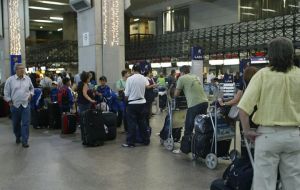MercoPress. South Atlantic News Agency
Major Brazilian airports on the verge of a “logistics blackout”
 The worst case in Manaus but in Sao Paulo air terminals are also at over capacity at peak hours
The worst case in Manaus but in Sao Paulo air terminals are also at over capacity at peak hours Airports in the major cities of Brazil that will be hosting the World Cup in 2014, and the Olympic Games in 2016, are working at their maximum capacity and eight of them are described as “in the edge of operational collapse” according to a report from the Applied Economics Research Institute in Sao Paulo, IPEA.
The report from the federal government office warns that there is a serious risk of a “logistics blackout” in the air travel industry unless immediate investments are initiated. The most serious case involves the city of Manaus, in the Amazon region which at peak hours is technically prepared to deal nine landing and take off operations but is currently handling 17.
“The situations considered serious and of concern are those when the use of existent capacity is above 80%. Critical cases are those when the operational capacity is clearly overwhelmed and results in a deterioration of service level. In these cases, depending on the percentage reached, the situation is considered as on the verge of operational collapse”, said the IPEA report.
The airports Congonhas and Guarulhos from the metropolis of Sao Paulo, which will host the World Cup 2014 semi-finals, are also under extreme strain.
Congonhas capacity is 24 landing and take off operations to the hour, but at peak times has to deal with 34, while Guarulhos the situation is 53 at normal rate and 65 on peak demand.
The IPEA report does not include other 2014 World Cup city airports such as Cuiabá, Salvador, Fortaleza and Recife, but the situation in these air terminals is also “of great concern”.
Last October the Brazilian Airports Infrastructure Corporation, Infraero, announced an investment of 7 billion US dollars in 16 terminals with the purpose of increasing the capacity of airports in major cities hosting the 2014 Cup by 66.4%.




Top Comments
Disclaimer & comment rulesCommenting for this story is now closed.
If you have a Facebook account, become a fan and comment on our Facebook Page!